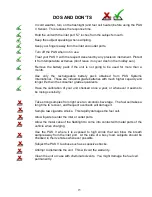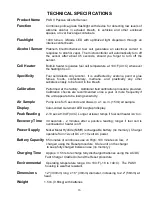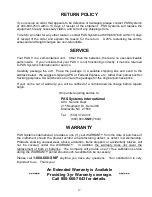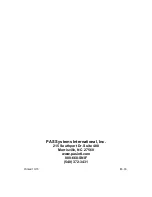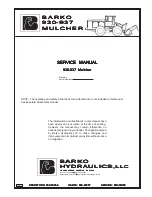
18
BIBLIOGRAPHY
Fergu
son, S. A., Wells, J.K. and Lund, A.K. “The Role of Passive Alcohol Sensors in
Detecting Alcohol-Impaired Drivers at Sobriety Checkpoints",
Alcohol Drugs and Driving
,
January-March 1995. 11:23-30.
Fields, M. and Hricko, A.R. "Passive Alcohol Sensors - Constitutional Implications",
Insurance Institute for Highway Safety
, February 1986.
Fields, M. “Passive Alcohol Sensors and Sobriety Checkpoints”,
Insurance Institute for
Highway Safety,
November 2000.
Foss, R. D., Voas, R. B. and Beirness, D. J. "Using a Passive Alcohol Sensor to Detect
Legally Intoxicated Drivers",
American Journal of Public Health
, April 1993. 83(4).
Jones, I. S. and Lund, A. K. "Detection of Alcohol-Impaired Drivers Using a Passive Alcohol
Sensor",
Journal of Police Science and Administration
, 14:153-60.
Lacey, J., et al. Enforcement and public information strategies for DWI general deterrence:
Arrest drunk driving. The Clearwater and Largo, Florida Experience. Technical Report.
Washington, DC: National Highway Traffic Safety Administration.
Martin, Peter G. "Air-Borne Alcohol Sensors", US. Patent No. 5,055,268, 1991.
Ross, H. L. "Deterring the Drinking Driver: Legal Policy and Social Control", Lexington, Mass.
Lexington Books.
Voas, R. B. and Lacey, H. M. Drunk driving enforcement, adjudication, and sanctions in the
United States. In: R. J.Wilson and R.E. Mann, (Eds). "Drinking and Driving Advances in
Research and Prevention", New York: Guilford Press. 1990
Voas, R. B., Rhodenizer, A. E., and Lynn,C. Evaluation of Charlottesville checkpoint
operations. Final Report. Washington, DC: National Highway Traffic Safety Administration,
1985.
Voas, Robert B. , "PAS IV Procedure Manual for Sensitivity Checks and Instrument
Calibration", Prevention Research Center, Berkeley, California, September 1994.
"Why Sobriety Checkpoints Matter and How To Make Them Work Even Better",
Status Report
,
Insurance Institute for Highway Safety, Arlington: Virginia, 1993. 28: 1-5












